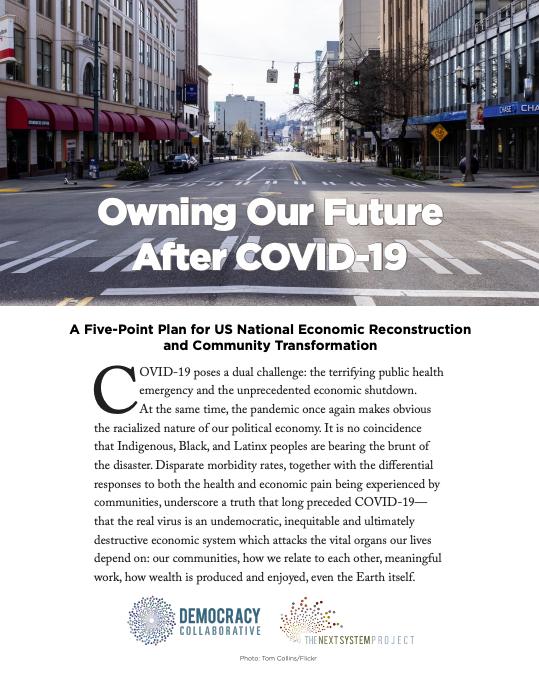COVID-19 poses a dual challenge: the terrifying public health emergency and the unprecedented economic shutdown. At the same time, the pandemic once again makes obvious the racialized nature of our political economy. It is no coincidence that Indigenous, Black, and Latinx peoples are bearing the brunt of the disaster. Disparate morbidity rates, together with the differential responses to both the health and economic pain being experienced by communities, underscore a truth that long preceded COVID-19—that the real virus is an undemocratic, inequitable and ultimately destructive economic system which attacks the vital organs our lives depend on: our communities, how we relate to each other, meaningful work, how wealth is produced and enjoyed, even the Earth itself. The destructive power of this extractive capitalism, revealed again through this pandemic, has been relentless. Its appetite for extraction is insatiable, its capacity for destruction seemingly limitless. People of color in America have certainly suffered the worst effects of this system, but others—women (including women of color, of course), LGBTQI peoples, youth, our elders, and the white working class, have all endured violence at the hands of this system. People of color remain the primary targets, and race and racism continue to be weaponized to divide and conquer and to undermine the possibility of solidarity amongst these groups.
If past performance is a predictor of future outcomes, the COVID-19 pandemic points to a grim future. As the initial crisis passes, we will reemerge into a shattered economic landscape, with the old inequalities of wealth, power, and control we faced beforehand newly amplified many times over. The challenge will be to rebuild this broken economy as one that is not only financially resilient but also sustainable, just, and reparative.
For advocates of a new way—a new world, even—the occasion demands bold and strategic ambition, grounded in an honest reassessment of our prior convictions and assumptions. This paper proposes a cohesive response to the crisis in the form of a five-point plan for national economic reconstruction and community transformation:
- Preserve local community economies by blocking financial extraction and consolidation;
- Extend public ownership in the public interest;
- Ground economic reconstruction in a new era of community wealth;
- Institute a green industrial strategy on the basis of a green stimulus recovery package;
- Establish a next-generation institute to support the movement for a democratic economy.
We see this plan as the basis for orienting The Democracy Collaborative, in partnership with the growing democratic economy movement, toward a limited number of points of intervention for maximum leverage in a time of crisis. We realize that many of our peer organizations in the United States, and indeed in other countries, are themselves pivoting to meet the challenges of this time. As we have since The Democracy Collaborative was established 20 years ago, we will continue to learn from and work with others as we evolve our own program and seek to make our contribution. We are all in this together, and this historic moment demands the shared experience and wisdom of all who are struggling for a more just, inclusive and democratic system.
Read the full paper here.
